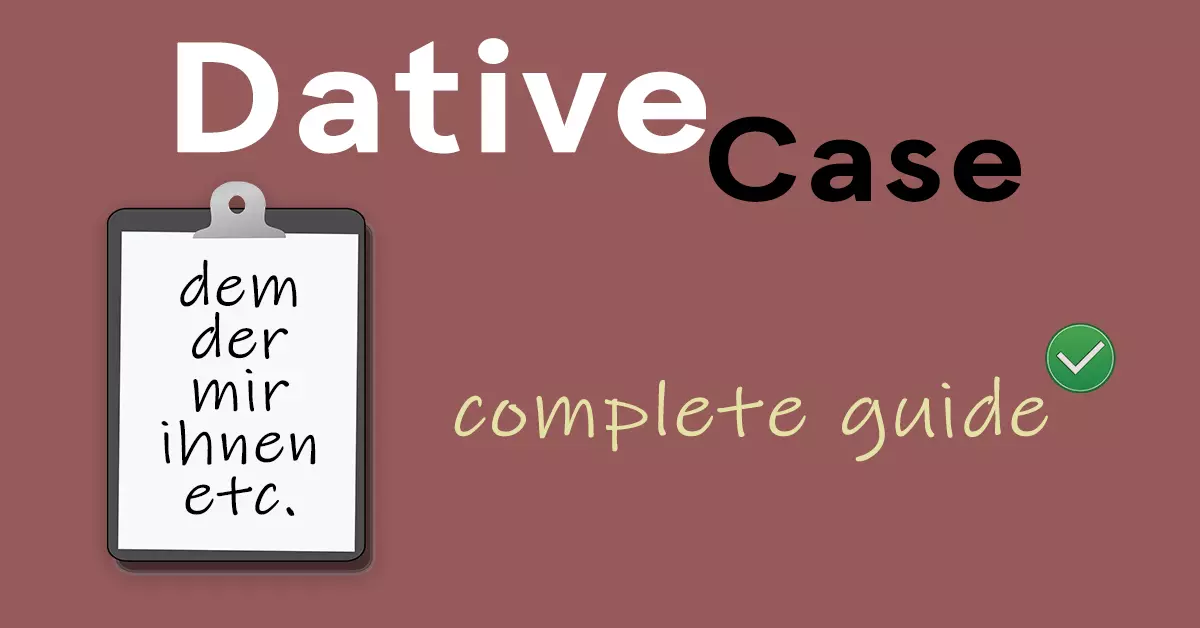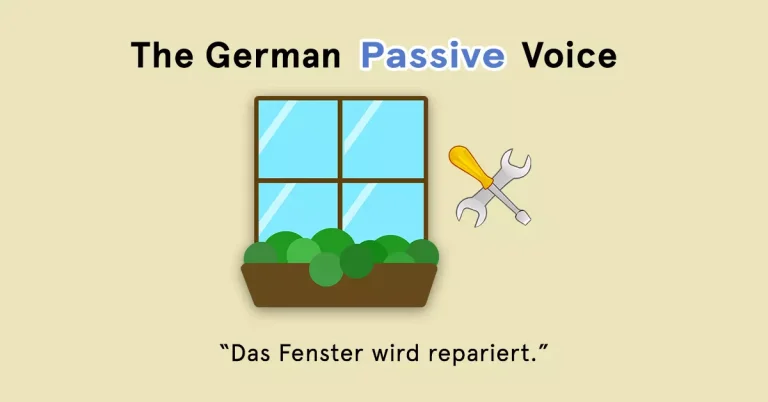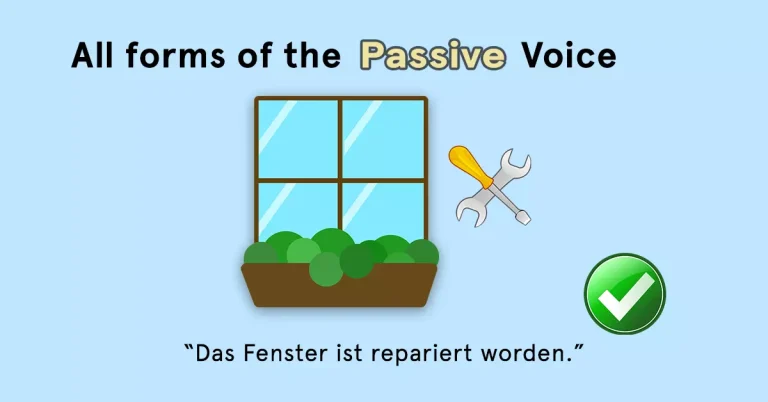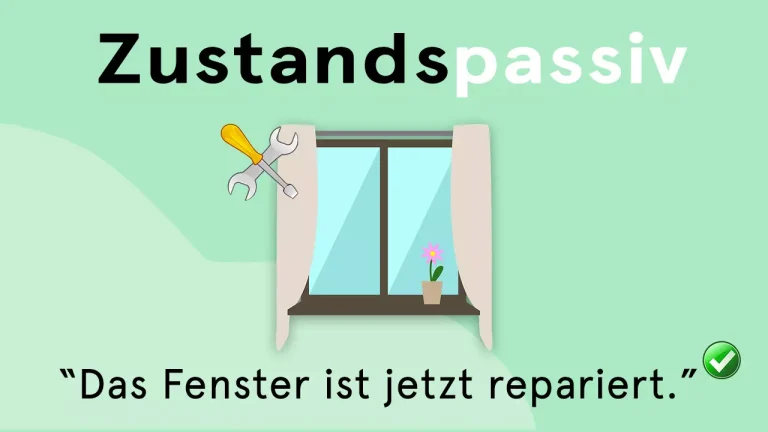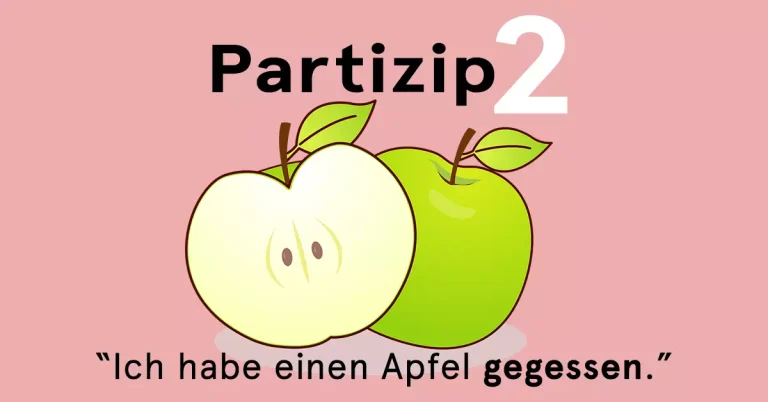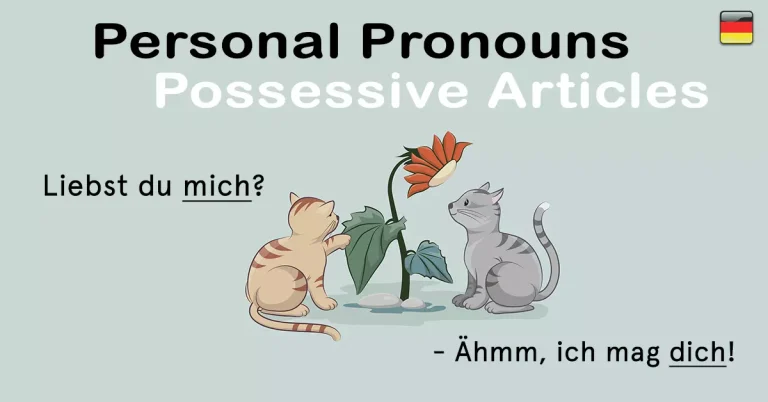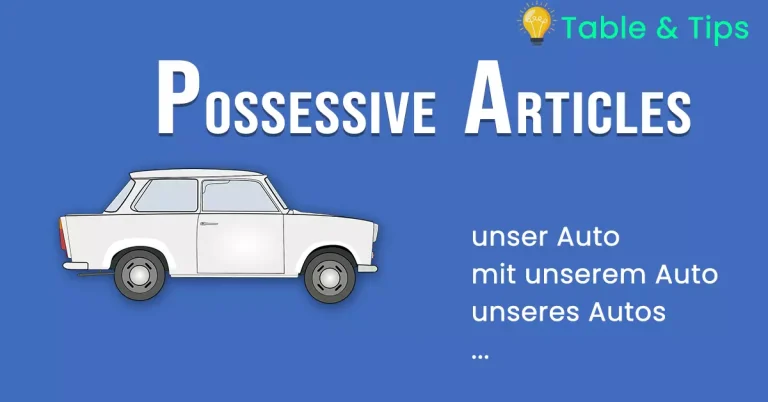In this article I’ll show you exactly what the German dative case is and when and how to use it. If you’re struggling to understand what it is and what the difference from the accusative case is, this article is for you!

What it is a case?
There are 4 cases in German: nominative, accusative, dative and genitive. The case indicates the relationship of the noun to the other elements in the sentence. Nouns (e.g. Mann), their article (der, die das, etc.), adjectives (e.g. schön) and the noun substitutes (pronouns) are adjusted to the case.
Declension of nouns, article, adjectives and pronouns means that you need to change the endings of those words, i.e. you need to decline them.
“Der schöne Mann” is nominative case (the subject case) and “dem schönen Mann” is dative case. As you can see, we changed the endings of the article (dem) and the adjective (schönen).
Next, let’s take a look at all the dative forms before we move on to the usage section where I’ll show you exactly when to use these dative forms.
Dative forms
We’ll first take a look at the dative forms of the personal pronouns (ich, du …). Then I’ll show you the dative articles and finally the dative adjective endings.
Please don’t be scared of these tables of the articles below. There are different kinds of articles, but they all take the exact same endings.
Personal pronouns
| Nominativ | Akkusativ | Dativ |
| ich | mich | mir |
| du | dich | dir |
| er/sie/es | ihn/sie/es | ihm/ihr/ihm |
| wir | uns | uns |
| ihr | euch | euch |
| sie/Sie | sie/Sie | ihnen/Ihnen |
You can find the complete table of personal pronouns and possessive articles in this article.
I have included the accusative personal pronouns here as well. Read more on the accusative case after you’ve read this article.
Definite articles
| maskulin | feminin | neutral | Plural | |
| NOMINATIV | der Mann | die Frau | das Kind | die Häuser |
| DATIV | dem Mann | der Frau | dem Kind | den Häusern |
masculine ►m
feminine ►r
neutral ►m
plural ►n
And these signal endings will be the same for the other types of articles (indefinite, possessive, negative) as well.
Indefinite articles
| maskulin | feminin | neutral | Plural | |
| NOMINATIV | ein Mann | eine Frau | ein Kind | *Häuser |
| DATIV | einem Mann | einer Frau | einem Kind | *Häusern |
*Please note that there is no indefinite articles in the plural. Instead, we use the zero article (Nullartikel).
Possessive articles and negative articles
| maskulin | feminin | neutral | Plural | |
| NOMINATIV | mein Mann kein Mann | meine Frau keine Frau | mein Kind kein Kind | meine Häuser keine Häuser |
| DATIV | meinem Mann keinem Mann | meiner Frau keiner Frau | meinem Kind keinem Kind | meinen Häusern keinen Häusern |
You can find the complete table of personal pronouns and possessive articles in this article.
The other possessive articles (dein, sein, ihr, unser …) change in the very same way.
As we’ve seen, luckily, the four different types of articles all take the same endings: “m” for the masculine and neutral, “r” for the feminine and “n” for the plural. In the plural, you also have to add an “n” the noun as well.
Adjectives
| maskulin | feminin | neutral | Plural | |
| NOMINATIV | der schöne Mann ein schöner Mann | die schöne Frau eine schöne Frau | das schöne Kind ein schönes Kind | die schönen Häuser schöne Häuser |
| DATIV | dem schönen Mann einem schönen Mann | der schönen Frau einer schönen Frau | dem schönen Kind einem schönen Kind | den schönen Häusern schönen Häusern |
You can find the adjective endings for all cases in this article.
As you can see from this table, adjectives in the dative case always have an “n” as their ending, for all cases – singular and plural. Easy, right?
The only time where this is different is if there is no article in the singular. The next subchapter discusses the zero article. If you’re just starting to learn German, you can skip that part.
Zero articles & adjectives
As I’ve mentioned above, we call the absence of an article the zero article. It is essentally the usage of a noun without an article. With the zero article the adjective needs to take the signal endings (as shown above):
masculine ►m
feminine ►r
neutral ►m
plural ►n
Think about it this way: In order to indicate that we have a dative case, we need these signal endings. They are usually in the article (dem, einem, meinem, keinem or der, einer …). If there is no article, we need to put the signal endings at the end of the adjecives, otherwise we wouldn’t be able to indicate that it is, in fact, dative case.
| maskulin | feminin | neutral | Plural | |
| NOMINATIV | schöner Mann | schöne Frau | schönes Kind | schöne Häuser |
| DATIV | schönem Mann | schöner Frau | schönem Kind | schönen Häusern |
In the plural, the zero article is VERY common as there is no indefinite plural article. In the plural we see that the adjective ending doesn’t change at all (den schönen Häusern vs. schönen Häusern). In fact, we get up to 3 times an “n” in the dative plural: the articles gets one (if there is one), the adjective and even the noun changes and gets an “n” – no matter whether we use an article or not.
In the singular the zero article is not very common. Whenever you’re in doubt, use an article! It mainly occurs with uncountable nouns (Kaffee mit frischer Milch).
Usage of the dative case
We have to use dative in three different scenarios. With verbs, with prepositions and in some other expressions (mainly in combination with adjectives). Read all about these 3 usage fields and their sub-sections.
Verbs with the dative case
Verbs with 1 object
This is a fairly small group. Verbs that only take one object almost always take the accusative case. Please note that we’re talking about direct objects (accusative objects) and indirect objects (dative objects), NOT about prepositional objects (jemandem für etwas danken). So whenever a verbs only takes one “prepositionless” object, it’s usually a direct object (accusative case) and rarely an indirect object (dative case).
Here’s a short list with the most important verbs with one object that take the dative case.
The vertical line “|” (e.g. weh|tun) between prefix and verb stem indicates that the verb is separable.
| jemandem antworten | Kannst du mir bitte schnell antworten? Can you please answer me quickly? |
| jemandem für etwas danken | Ich danke dir für das tolle Geschenk. Thank you for the great gift. |
| jemandem folgen | Ich folge dieser Schauspielerin auf Instagram. I follow this actress on Instagram. |
| jemandem gefallen | Hat dir der Film gefallen? Did you like the film? |
| jemandem gehören | Wem gehört diese Tasche hier? Whose bag is this? (Who does this bag belong to?) |
| jemandem gelingen | Der Kuchen ist dir sehr gut gelungen! The cake turned out very well! |
| jemandem zu etwas gratulieren | Ich gratuliere dir zur bestandenen Führerscheinprüfung! Congratulations on passing your driving test! |
| jemandem helfen | Kannst du mir bitte mal kurz helfen? Can you give me a hand, please? |
| jemandem passen | Das T-Shirt passt dir sehr gut! The t-shirt fits you very well! |
| jemandem schmecken | Ich hoffe, das Essen hat euch geschmeckt. I hope you enjoyed the food. |
| jemandem stehen | Das T-Shirt steht dir leider gar nicht! The T-shirt doesn’t suit you at all! (… doesn’t look good on you!) |
| jemandem vertrauen | Ich vertraue dir! Vertraust du mir? I trust you! Do you trust me? |
| jemandem weh|tun | Mein Knie tut mir weh! My knee hurts! |
| jemandem widersprechen | Ich muss dir leider widersprechen. I’m afraid I have to disagree with you. |
| jemandem zu|stimmen | Ich kann dir leider nicht zustimmen. I’m afraid I can’t agree with you. |
Verbs with 2 objects
This is a list of verbs that take 2 objects (again direct/indirect, not prepositional objects). The objects will almost always be dative object and accusative object. Almost always the dative object will be a person whereas the accusative object will usually be a thing.
The person “jemandem” (in the dative case) is usually the recipient of something “etwas” (in the accusative case). This becomes especially clear with verbs like geben, senden etc.
The vertical line “|” (e.g. an|bieten) between prefix and verb stem indicates that the verb is separable.
| jemandem etwas (an)|bieten | Kannst du uns eine Lösung anbieten? Can you offer us a solution? |
| jemandem etwas (aus)|leihen | Ich habe dir 100€ ausgeliehen. I lent you 100€. |
| jemandem etwas beantworten | Bitte beantworte mir diese Frage. Please answer this question (for me). |
| jemandem etwas bei|bringen | Kannst du mir das Tanzen beibringen? Can you teach me how to dance? |
| jemandem etwas bringen | Kannst du mir bitte ein Glas Wasser bringen? Can you bring/get me a glass of water, please? |
| jemandem etwas empfehlen | Kannst du mir ein gutes Restaurant empfehlen? Can you recommend a good restaurant to me? |
| jemandem etwas erklären | Kannst du mir das bitte noch einmal erklären? Can you please explain this to me again? |
| jemandem etwas erzählen | Kannst du mir einen Witz erzählen? Can you tell me a joke? |
| jemandem etwas geben | Kannst du mir bitte das Salz geben? Can you give/pass me the salt, please? |
| jemandem etwas glauben | Ich glaube dir kein Wort!! I don’t believe a word you say!!! |
| jemandem etwas kaufen | Ich habe mir letzte Woche ein neues Handy gekauft. I bought (myself) a new mobile phone last week. |
| jemandem etwas machen | Sie hat ihm eine Tasse Tee gemacht. She made him a cup of tea. |
| jemandem etwas mit|bringen | Bringst du mir bitte eine Tüte Chips mit, wenn du kommst? Can you bring me a bag of chips when you come, please? |
| jemandem etwas sagen | Lüg mich nicht an! Sag mir die Wahrheit!! Don’t lie to me! Tell me the truth!! |
| jemandem etwas schenken | Ihre Eltern haben ihr ein Fahrrad zum Geburtstag geschenkt. Her parents gave her a bicycle for her birthday. |
| jemandem etwas schreiben | Sie hat ihm einen langen Brief geschrieben. She wrote him a long letter. |
| jemandem etwas schulden | Du schuldest mir 100€. You owe me 100€. |
| jemandem etwas verkaufen | Er hat ihm sein Auto verkauft. He sold him his car. |
| jemandem etwas wünschen | Ich wünsche dir alles Gute zum Geburtstag. I wish you a happy birthday. |
| jemandem etwas zeigen | Kommen Sie, ich zeige Ihnen unsere neue Wohnung. Come, I’ll show you our new flat. |
Many of these verbs can also only take a dative object (jemandem antworten, jemandem schreiben) or only an accusative object (etwas verkaufen, etwas schreiben). What’s important here is they have the ability to take two objects: usually a person (dative) and a thing (accusative).
Prepositions with the dative case
Dative prepsitions (100%)
Prepositions are always followed by nouns. The noun (and especially the preceding article and/or adjective) needs to be in a certain case. The right case is determined by the preposition. Here is a list of the most important dative prepositions:
| seit | Er wohnt seit einem Jahr in Berlin. He has been living in Berlin for a year. Er wohnt seit seinem 10. Lebensjahr in Berlin. He has lived in Berlin since he was 10 years old. |
| bei | Er wohnt bei seinem Onkel. He is living with his uncle. |
| nach* | Nach drei Tagen war er zum Glück wieder gesund. Fortunately, after three days he was well again. Meiner Meinung nach ist das eine schlechte Idee. In my opinion, this is a bad idea. |
| aus | Er kommt ursprünglich aus den USA. He originally comes from the US. Sie nahm ein dickes Wörterbuch aus dem Schrank. She took a thick dictionary out of the cupboard. |
| von | Ist das Handy hier von dir? Is this phone yours? Er hat einen Brief von seinem Onkel bekommen. He got a letter from his uncle. |
| mit | Willst du morgen mit mir ins Kino gehen? Would you like to go to the cinema with me tomorrow? |
| zu | Morgen muss ich zum Arzt gehen. (zum = zu dem) Tomorrow I have to go to the doctor. |
For these 7 most important dative prepositions I’ve come up with a mnemonic device that can help you memorize them:
Sein bayrischer Nachbar aß Vanilleeis mit Zimt.
sein = zu; bayrischer = bei; Nachbar = nach; aß = aus; Vanilleeis = von; mit = mit; Zimt = zu
It translates as: His Bavarian neighbour ate vanilla ice cream with cinnamon.
*The preposition “nach” is commonly in the local sense (Er reist nach Österreich.) where it is almost always used without an article (and without an adjective). This means that you don’t have to worry about case endings as there is nothing that has to be changed. In the other senses of the preposition (e.g. temporal), there usually will be an article and/or adjective or a pronoun which needs to be declined (meiner Meinung nach; Er warf den Schlüssel nach mir.)
There is one more preposition “ab”, which is used with the dative case (ab dem 18. Lebensjahr). However, it is often used with the accusative case as well, especially when used without an article (ab nächster Woche / ab nächste Woche), which is quite a common usage with this preposition. And most often, there is no article and no adjective either (ab Mai, ab 1990) and in this case you don’t need to worry about case endings in the first place.
Wechselpräpositionen (50%)
They are sometimes called two-way prepositions in English. They can take the dative case or the accusative depending on the meaning:
- wo? ►dative case
Wo wohnt dein Onkel? – Er wohnt in einer kleinen Stadt im Norden.- wohin? ►accusative case
Wohin fährst du nächsten Sommer? – Ich fahre in die Berge.- wann? ►dative case
Wann bist du nach Hause gekommen? – Vor einer Stunde.
The dative case is used when there is no change of place expressed (wo? = where?), when something is stationary and you want to describe a place. The accusative case is used when there is a change of place expressed, when someone or something is moving from place A to another place B (wohin? = where … to?).
What many people forget is that 4 of the 9 Wechselpräpositionen (in, an, zwischen and vor) can also have a temporal meaning. In this meaning the noun that follows always has to be in the dative case: im Mai, am Montag, zwischen dem Mittag- und dem Abendessen, vor einer Stunde. So for the local sense, the correct case depends on whether there is a change of place or not, whereas in the temporal sense, we don’t have any distinction: always dative case.
This is a list of the 9 Wechselpräpositionen. All examples use the prepositions in the local sense and they are all used with a dative noun as in each examples there is no change place involved:
| in | Er wohnt in einer kleinen Stadt. He lives in a small town. |
| an | Ich möchte gern am Fenster sitzen. I would like to sit by/at the window. |
| auf | Die Flasche steht auf dem Tisch. The bottle is (standing) on the table. |
| neben | Ich wohne neben einem großen Supermarkt. I live next to a big supermarket. |
| zwischen | Zwischen den beiden Bäumen stand eine kleine Holzbank. There was a small wooden bench between the two trees. |
| über | Die Lampe hängt über dem Tisch. The lamp hangs over the table. |
| unter | Der Hund liegt unter dem Tisch. The dog lies under the table. |
| vor | Er sitzt den ganzen Tag nur vor dem Fernseher. He just sits in front of the TV all day. |
| hinter | Hinter den Häusern beginnt der Stadtwald. The city forest begins behind the houses. |
Genitive Prepositions in spoken German
The prepositions wegen (because of), während (during), trotz (inspite of) and (an)statt (instead of) are used with the genitive case in standard German. However, in spoken/informal German they are sometimes used in the dative case as well: wegen den Kindern, während dem Mttagessen etc.
Some expressions
The dative case is also used with some adjectives:
| bewusst | Das war mir nicht bewusst. I wasn’t aware of that. |
| böse | Bist du mir böse? Are you angry with me? |
| dankbar | Er war seiner Lehrerin sehr dankbar. He was very grateful to his teacher. |
| egal | Das ist mir total egal! I couldn’t care less! |
| heiß | Plötzlich wurde ihm heiß. Suddenly he felt hot. |
| kalt | Ist dir kalt? Soll ich das Fenster zumachen? Are you cold? Shall I close the window? |
| peinlich | Das war mir total peinlich! I was totally embarrassed! |
| recht | Wir können uns morgen treffen, wenn dir das recht ist. We can meet tomorrow if that’s okay with you. |
| schlecht | Mir ist schlecht. I’m feeling sick. |
| schwindelig | Mir ist schwindelig. I’m feeling feel dizzy. |
| warm | Mir ist sehr warm. Ich zieh meinen Pulli aus. I am very warm. I’ll take off my jumper. |
| übel | Ihm wurde ganz übel. He felt quite sick. |
Finally, the dative is also used a lot in combination with body parts and clothes. Quite often we get a reflexive pronoun in the dative case here.
- Ich wasche mir die Hände.
I wash my hands. - Ich habe mir die Haare gekämmt.
I combed my hair. - Ich habe mir den Magen verdorben.
I’ve upset my stomach.
Exercises
Test your knowledge with exercises on this topic!

For DMM members only. You can sign up for free or make a voluntary monthly donation.
